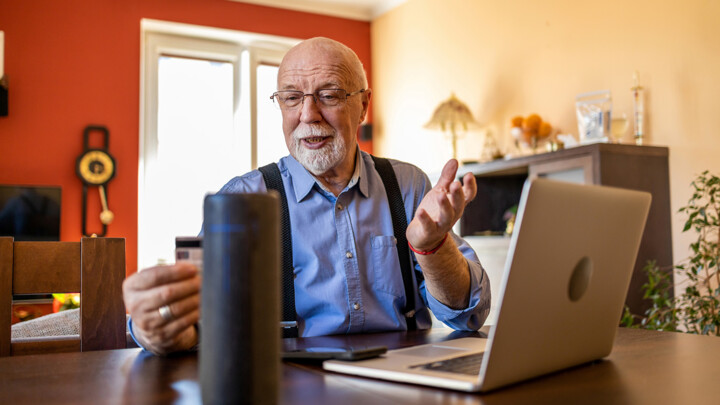AI Solutions for Elder Care #thenursinghomecanwait
Dr. Bettina Horster reveals how VIVAIcare's groundbreaking AI solution, Vivi, is revolutionizing elder care. From personalized reminders to safety features, discover how AI is reshaping independent living and supporting mental health.

© PIKSEL | istockphoto.com
Artificial Intelligence (AI) is rapidly evolving, playing an increasingly pivotal role not only in our professional lives but also as a cornerstone in everyday living. New technologies are often the realm of the young, but they can also offer substantial support to older people. AI solutions for elder care show particular promise in helping older people live independently for longer. VIVAI Software AG has developed a concrete solution, VIVAIcare, which is already being used successfully throughout homes in Germany and is even covered by public health insurance policies. The system has been named one of the best in the world by the Hong Kong Social Security Agency. The system has also received awards from the German government, the EU Commission, and the UN.
A user-friendly interface that prioritizes user privacy
While the system’s backend is intricate, the front end is very user-friendly. Users can talk to the AI interface, “Vivi”, like a human and the system not only records or informs about health information but also reminds users of medical appointments, to drink or to take medication. The latter function is particularly useful if more than one type of medication needs to be taken, perhaps several times a day. Vivi prioritizes user privacy, ensuring strict data confidentiality. Any interactions are stored securely and can only be accessed by people who have the according user rights. As a German company, VIVAIcare adheres strictly to the requirements of the European General Data Protection Regulation (GDPR).
AI solutions for elder care can help with staying active and engaged
As I put it in my talk at the Mobile World Congress 2022 on life-altering wearables in healthcare, “there are not enough kids to take care of their parents”. Anticipating future demographic changes with more and more people living for longer and longer, often with no immediate family living close to support them, Vivi provides an alternative means of staying active and engaged. Using large language models (LLMs), Vivi, the dedicated hardware with the voice assistant, addresses and aims to alleviate many of the cognitive issues that can come with age or for people with neurological issues or executive functioning disorders. With reminders, regular conversations and verbal interactions, Vivi assists with complex tasks and alleviates the cognitive burden of tracking health metrics. It provides reminders for various tasks, helping to structure daily routines.
The system has various optional modes. More and more is becoming possible with the use of large language models (LLMs). Vivi can engage in biographical work, helping users recall and organize important aspects of their lives. This is part of the therapist mode, which offers valuable insights. The pastoral mode mimics conversations with a priest, an Iman, or other spiritual leaders. The system can offer nutritional advice, and there is even a light-hearted and compassionate companion Vivi. It is important to note that indicating the machine nature of these interactions on Vivi’s screen is vital, particularly for users with cognitive issues, so it’s clear to them that they are not interacting with an actual human.
Supporting mental health with Positive Psychological Interventions (PPIs)
Many public health initiatives, like the German government's campaign against isolation and loneliness, inadvertently overlook the potential of technology. AI solutions for elder care can help address loneliness among senior citizens who live on their own and lack regular social interactions. Vivi, designed to counteract this isolation, engages users in positive conversations. The AI prompts users to recall enjoyable moments and rewarding experiences. This module, based on the latest scientific findings in the field of Positive Psychology, has been developed in collaboration with the University of Munster and is designed around Positive Psychological Interventions (PPIs). By encouraging users to reflect on the positive aspects of their day, Vivi aims to foster a positive mindset and provide a meaningful experience.
Safety and peace of mind
In nursing care, Vivi complements traditional services, aiding in remote assessment and streamlining communication during emergencies. Vivi’s holistic approach includes keeping an activity index. Relatives can get a glimpse into the black box apartment, if the resident consents. Family members can monitor activities, gaining insights into daily routines – and any disruptions thereto – and potential health issues.
Vivi supports individuals with dementia by adapting to various cognitive levels, focusing on ensuring users’ safety when they can no longer use the wake word. The system monitors vital signs, reminding users to check blood pressure, blood sugar, and weight, utilizing smart devices or user input.
While it does not necessarily reduce caregiving hours, Vivi helps to address the challenge of scarce nursing services. It includes emergency support with fall detectors that work without cameras, ensuring privacy at all times. The system can automatically alert relatives who are part of an alarm chain also involving neighbors and home emergency services. This human-in-the-loop element is particularly important as many emergency services do not respond to machine-triggered emergency calls.
The potential of AI solutions for elder care
Looking ahead, the potential for using Large Language Models (LLMs) technology in AI solutions for elder care lies in integrating additional sensors into the system. Collaborations with companies like Garmin offer interesting possibilities to use geofencing and location-tracking functionality to e.g. keep dementia patients safe. VIVAIcare’s dream is to create a comprehensive ecosystem with services like cleaning and grocery shopping. Here, maintaining a balance to avoid excessive dependency is crucial.
Vivi’s language availability can be expanded to nearly every language where there is a text-to-speech engine. It is currently only available in German but there is much interest from other countries.
Ensuring inclusivity and user-friendliness, especially for individuals with health restrictions, remains a focal point. Adaptation to various accents and dialects, along with accessibility in remote areas, underscores the importance of tailoring technology to diverse user needs. Ultimately, the aim is to create an inclusive system that enhances the quality of life for older individuals.

Interested in this topic? Explore the work of eco’s Internet of Things Competence Group
Dr. Bettina Horster is Head of Business Development at VIVAI Software AG and is responsible for the area IoT (Internet of Things, Industry 4.0, M2M). She is also Head of the IoT Competence Group of eco – Association of the Internet Industry. In her role at eco, she is committed to the expansion of IoT solutions across all industries and digitalization in the healthcare sector. She has been involved with the Internet of Things since 2009 and is a pioneer in the field.






